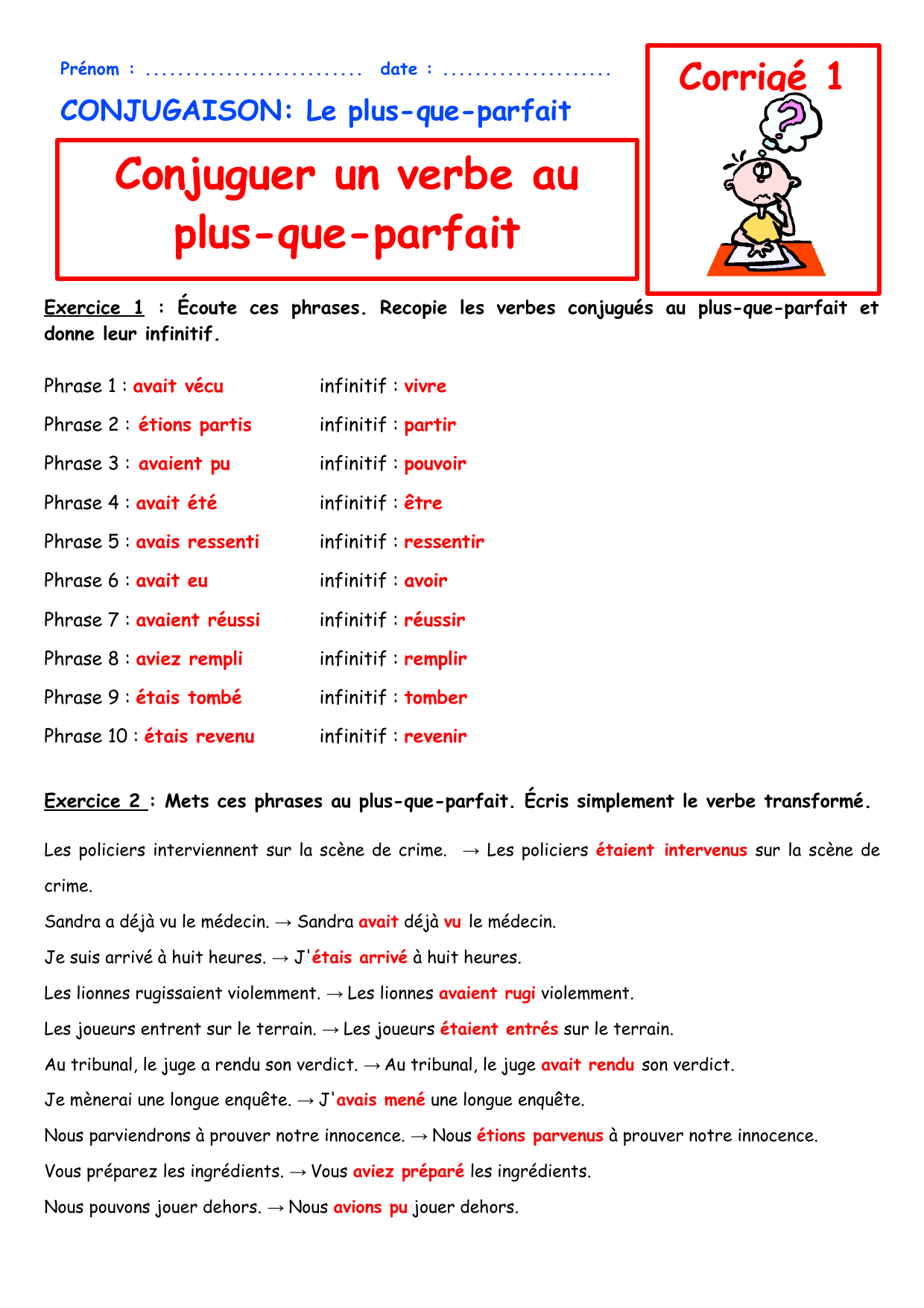

Agreement of the participe passéįor some verbs, the participe passé has to agree in gender and number with either the subject or the object of the sentence.
If the infinitive ends in -re, the participle ends in uįor the irregular verbs, however, we have to look up the participle forms in the list of irregular verbs or check the verb conjugator – or simply learn the correct forms by heart. If the infinitive ends in - ir, the participle ends in i Example: fin ir – fin i. If the infinitive ends in -er, the participle ends in é Example: aim er – aim é. Example: À quelle heure étais -tu sorti ce matin-là ? What time had you left that morning? no direct object, sortir = leave but: Avais-tu sorti les carottes du frigo hier soir ? Had you taken the carrots out of the fridge yesterday evening? direct object: les carottes, sortir = take out Participe passé: the past participleįor the regular - er/- ir/-re verbs, the participe passé is easy to construct: In this case, the meaning of the verb often changes. 
We use avoir when descendre, (r)entrer, (re)monter, retourner and sortir are followed by a direct object. I had gone to Brittany on holiday.Ĭheck out our page on avoir/être to pick up some tips on remembering which verbs take être as their auxiliary in the compound tenses.
with the following verbs of movement and their related forms: naître/mourir to be born/to die, aller/venir to go/to come, monter/descendre to go up/to go down, arriver/partir to arrive/to leave, entrer/sortir to enter/to go out, apparaître to appear, rester to stay, retourner to return, tomber to fall and their related forms such as: revenir to come back, rentrer to go back in, remonter to go back up, redescendre to go back down, repartir to leave again.Įxample: J’ étais parti(e) en vacances en Bretagne. with reflexive verbs Example: Je m’étais trompé(e) dans mon calcul. Most verbs construct the plus-que-parfait using avoir, however être is used as the auxiliary verb in the following cases: Example: Je ne m’étais pas trompé dans mon calcul. I had left.→ I had not left.įor reflexive verbs, the reflexive pronoun comes after the first part of the negation (ne) and before the auxiliary verb (avoir/être). – It had sold before the summer.In negative sentences, the past participle comes after the second part of the negation (pas). The house had gotten sold before the summer. The house had been sold before the summer. The course had been given before the summer. agrees in gender and in number with that direct-object reflexive pronoun – ie. ( Note: When using the "Passif pronominal (direct)" format, the reflexive pronoun is also the direct object (of the participe passé ( p.p.) of the main verb) and it also precedes the p.p., so the p.p. Sujet (nom ou pronom, inanimé, – objet direct du verbe principal) + s' + ( étai t, étaient) + verbe principal ( p.p.)(e.s.es ) Ģ8B.4 Passif pronominal– ( Plus-que-parfait) The (female) candidate/She had gotten spoken to. The (female) candidate/She had been spoken to. The (male) candidate/He had gotten spoken to. The (male) candidate/He had been spoken to. Note : In this context, the subject pronoun " On " means " someone unspecified " In this section, the examples use the " speak " meaning. The verb " parler " can mean speak or talk. ( Note: The participe passé ( p.p.) never agrees with an indirect object.) On (sujet indéfini) + pronom objet indirect + avait + verbe principal ( p.p.) When the indirect object appears as a pronoun: On (sujet indéfini) + avait + verbe principal ( p.p.) + objet indirect. When the indirect object appears as a noun: Ģ8B.3 Passif in direct– ( Plus-que-parfait) Note : In this context, the subject pronoun " On " means " someone unspecified ". agrees in gender and in number with that direct object.) ( Note: When there is a direct object, and it precedes the participe passé ( p.p.), the p.p. On (sujet indéfini) + pronom objet direct + avait + verbe principal ( p.p.)(e.s.es). When the direct object appears as a pronoun: On (sujet indéfini) + avait + verbe principal ( p.p.) + objet direct. When the direct object appears as a noun: Ģ8B.2 Passif direct– Option 2 – ( Plus-que-parfait) agrees in gender and in number with that subject/direct object.) 
( Note: When using the "Passif direct" - Option 1" format, the subject of the verb "être" must also be the direct object of the participe passé ( p.p.) of the main verb, and because it also precedes the p.p., the p.p. Sujet (nom ou pronom, objet direct du verbe principal) + ( avais, avais, avait, avions, aviez, avaient) + été + verbe principal ( p.p.)(e.s.es). 28B.1 Passif direct– Option 1 – ( Plus-que-parfait)







 0 kommentar(er)
0 kommentar(er)
